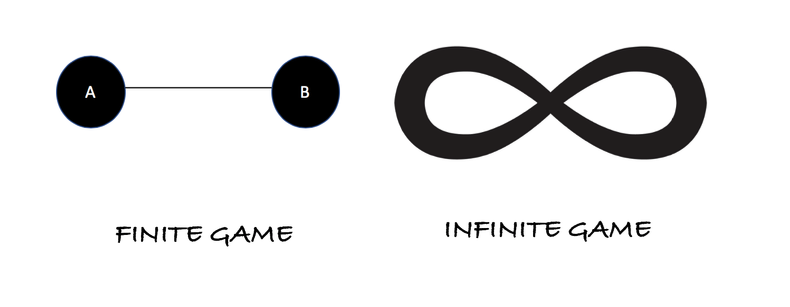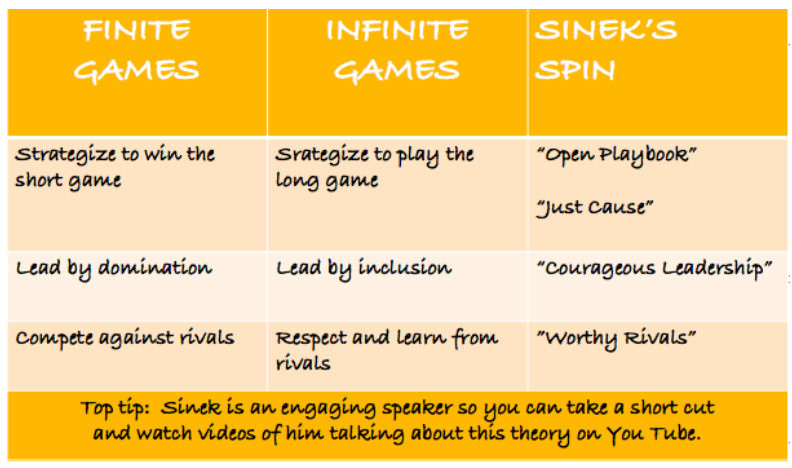Have you ever noticed that playing board games often erupts in fights because one family member accuses another of not playing according to the rules? Yet, when your family engages in play without set rules, like doing a TikTok video, their game develops organically and there are far fewer fights. They play with each other, not against each other.
In the business environment ‘the rules’ have changed and keep changing – how we must operate, what customer priorities are, what size of organisation we need. To thrive in an ever changing environment, success comes from continuing to play, to be able to adapt to changes as you go. To stay in ‘the game’, each player needs to interact with others to create the conditions that make the game last – to play an ‘infinite game’.
Game Theory
A ‘game’ is the way a player interacts with other players, according to certain rules and with certain consequences. You use ‘game theory’ when setting your business strategy, anticipating what your competitors will do in the market and weighing up the risks and costs of taking different courses of action. Back when I was in primary school, James Carse wrote a book called Finite and Infinite Games: A Vision of Life as Play and Possibility which put a then new perspective on classic game theory. More recently, Simon Sinek took his theory and applied it to business and leadership in his book The Infinite Game. Their central message is that actions in life are a part of two types of games: finite and infinite. Both games are played within rules, as accepted by the players (including you and the people you do business with – customers, suppliers and the like). However, the nature of the games is different.
“Finite games” are played to win certain achievements or roles which inherently limit the players’ potential. “Infinite games” are played with the goal of continuing the development and vision of the players themselves and those around them. Finite players focus on the results of their games, such as winning and losing, but infinite players focus on allowing the game to continue and give rise to multiple possibilities. However, you play the game is up to you.

Strategy Setting
If you set a goal like we want “to make $X by the end of 2020” or “to be the number 1 seller of X in New Zealand”, according to this theory you are playing a finite game, where your goal is simply to win by reaching a set target. However, if you create a vision like “we want to improve quality of life by supporting local and making cutting edge X”, you are playing an infinite game, where your goal is to continuously prosper. Now you might say – “hang on, if I make $X, I will be prospering?!” But the point is that by aiming at a set target, you are limiting yourself and what you and your business can achieve. By making your strategy a “Just Cause” you will inspire your staff and your customers. By making it an “Open Playbook” you can be flexible to changes in your circumstances.
Leadership Style
Players of finite games dominate those around them. This enables them to win their game. However, they are defined by their past and the limits of their game. To players of infinite games, such matters are irrelevant because their attention is on the future and what possibilities are to come. Infinite players liberate themselves from what others expect of them and are confident enough to trust their own instincts.
“Courageous Leaders”, who we want to follow, play infinite games. They will set a vision for their business and encourage others to join and work to develop it. They do not oppose the actions of others, but initiate actions of their own in such a way that others will respond by initiating their own. They co-exist with others, they give and take, to enable the goal of continuing and improving the game. They can transform their businesses and develop them by learning from those within and outside their teams. They enjoy playing the game by collaborating, rather than competing.
Industry Interactions
Sinek recommends that you should see businesses in your industry as “Worthy Rivals”, not enemies. As the goal of infinite games is to keep playing - not to win - you are not really in competition with them. Rather, they drive you to better and better levels of performance. Encourage your rivals to do better by pushing your own performance to its highest level. For the game to continue, there needs to be an understanding that rivals do not destroy each other and ethics must be followed.
A Style of Play to Suit Now
In finite games it is assumed that the range of possible outcomes are known. Change disrupts finite games and puts players off kilter. Change is a constant in infinite games and players adapt. Right now we don’t know what the final impact of Covid19 will be on business, who will win the election, whether protecting the environment or the economy will become the bigger priority – there are so many uncertainties. Because we are in an ever changing environment, we need to stay in the game and play to the power of infinity.

An abridged version of this article was published in the Otago Daily Times on 14 May 2020


